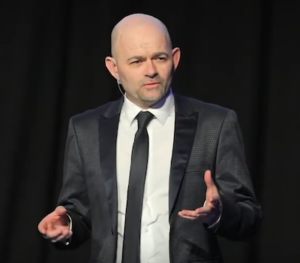
Blue Skies Thinking Needed
Competing and surviving in a highly technological, fast changing and globalised economy increasingly dictates that universities and institutes step up and generate economic returns on their research. But although there have been a few notable exceptions at New Zealand universities, we continue to underperform in the commercialisation of new scientific knowledge into value generating products and services that drive economic growth. So if disruptive innovation lies at the core of economic development, how can we better reconcile commercialisation with the core purpose of our institutions?
Firstly, there are some valid arguments in favour of the separation of commerce from academia. Normative, collectivist elements of academic science as a social system, along with the autonomous nature of university culture, seem to sit uncomfortably with the motivations of profit seeking firms that wish to take ownership of intellectual property. Claims of IP ownership can lead to fears of diminishing the scientific commons, which would be detrimental to the collegial and collaborative nature of science and therefore hinder the very process that will drive future discoveries.
Furthermore, commercialising technology research is risky and accommodating new and developing fields of commercially focused science takes up resources that might be used for other teaching and research, impacting the core mission of universities. We have already witnessed closures and staff reductions within arts and humanities faculties where commercial outcomes are less of a focus. There’s also a danger that high tech institutes established in emergent fields become impenetrable and elitist silos of specialist knowledge open to only a few, at a time when we should be striving for greater equity. Are there other societal factors at play that dampen success?
Patent filings data is sometimes quoted as an indicator of “innovativeness” in the context of economic development. New Zealand sits at the lower end of the table, but not because it is a small economy. Countries with relatively small populations such as Finland, Switzerland and Israel lead the pack. In New Zealand total expenditure on research and development as a proportion of GDP has been increasing in recent years, but continues to lag behind other developed countries. Investment rose to 1.37% in 2018. This compares to an average research intensity figure of 2.38% across all OECD countries, ranking New Zealand 21st out of 34 nations [Statistics NZ — 2018]. So whilst the size of an economy does not fully explain the innovativeness of a nation, the level of commitment to research and development investment certainly plays a part.
Approximately half of that R&D investment originates from publicly funded sources. With government investment comes an expectation that tax payer funded academic research will provide a “return on science” or economic and social benefits to society. The challenge then is to generate meaningful commercial outcomes, that do not undermine the core missions of teaching and research. There are a great many reasons to do so, not the least of which is our ability to fund future health, education and welfare needs. As a nation heavily reliant upon commodity based income we must gravitate towards higher added value goods and services to ensure the future economic wellbeing of our society. Developing an ecosystem approach to cultivating innovation is a key part of this journey.
For example, benefits in cultivating university-industry ties become amplified due to network effects and serendipitous conversations around the humble water cooler (or perhaps kombucha fridge these days). This “innovation ecosystem” approach has benefitted a number of scientific fields. For example the emergence of biotechnology as both a science and business from MIT and other institutions clustered within the Boston area. Commercialisation of new knowledge can also speed up solving complex social, health and environmental problems that might not otherwise be addressed, attracting both government and private sector funding into academia.
The global pandemic has also accelerated the need for scientific innovation. Previous hard won gains against poverty and improvements in social equity have been wiped out by pandemic related economic carnage. In addition, because of growing urgency in relation to addressing environmental challenges, there is forecast to be a vast migration of capital away from polluting industries over the next two or three decades. This green transition will create enormous opportunities for scientific organisations operating at the leading edge of cleantech, renewable energy, low carbon construction and regenerative agriculture, for example.
Embedded within entrepreneurship centres of research, university innovation labs such as ThincLab at the University of Canterbury are important intermediaries in the cycle of innovation and a key part of a vibrant ecosystem that engages with a wide array of supporting players to ensure the success of spin-off companies, whilst at the same time respecting the scholarship that underpins scientific discovery.
This article was first published on the ThincLab blog and formed the basis of my presentation to the Food, Fibre and Agritech Supernode Challenge 2021 cohort.
Paul Spence is a commentator and serial entrepreneur, a recently exited co-founder of a New Zealand based technology venture, a co-founder and director of Creative Forest, advisor at ThincLab within the University of Canterbury Centre for Entrepreneurship and principal at GeniusNet Research. You can follow Paul on Twitter @GeniusNet or sign up for a free weekly digest of startup, tech and innovation related events curated by him through New Zealand Startup Digest. Paul is a co-author of the Entrepreneurship Manifesto 2020.


 I was in a community call today contributing to the good work of the NZ Startup Council. It wasn’t long before somebody popped the “diversity question” into the conversation, complaining that women, migrants and people of colour can’t get help with their startups and do not get a fair hearing from investors in New Zealand. If that is true, I want to do something about it!
I was in a community call today contributing to the good work of the NZ Startup Council. It wasn’t long before somebody popped the “diversity question” into the conversation, complaining that women, migrants and people of colour can’t get help with their startups and do not get a fair hearing from investors in New Zealand. If that is true, I want to do something about it! The state government of Victoria has announced the first investments from a $2 billion fund for the commercialisation of research, science and technology. Breakthrough Victoria will focus on life sciences, agri-food, cleantech and digital technologies in a push to reboot the state’s post-Covid economy. The package includes $100 million for co-funding
The state government of Victoria has announced the first investments from a $2 billion fund for the commercialisation of research, science and technology. Breakthrough Victoria will focus on life sciences, agri-food, cleantech and digital technologies in a push to reboot the state’s post-Covid economy. The package includes $100 million for co-funding 

 The pandemic induced economic crisis has raised awareness that economies remain fragile since the GFC and that we must urgently shift to more sustainable and environmentally sound forms of economic development if we are to survive as a species. As a nation in the spotlight right now, New Zealand has an opportunity to lead with change. But we need a vehicle to drive this process and we must shift the mindset of the nation towards environmental entrepreneurship.
The pandemic induced economic crisis has raised awareness that economies remain fragile since the GFC and that we must urgently shift to more sustainable and environmentally sound forms of economic development if we are to survive as a species. As a nation in the spotlight right now, New Zealand has an opportunity to lead with change. But we need a vehicle to drive this process and we must shift the mindset of the nation towards environmental entrepreneurship. After missing the previous two events due to timetable clashes, the planets aligned and I finally made it to this year’s
After missing the previous two events due to timetable clashes, the planets aligned and I finally made it to this year’s  This week I gave my young son a tearful hug and watched him cross through airport security to join the first leg of a long journey to Europe. I found myself, reviewing the previous eighteen years and wondering whether or not I had done enough for him. His mother and I have a solid friendship now, but we separated when he was just two. So co-parenting presented numerous challenges for us for many years. Not the least of those was that (despite his intelligence) my son sometimes struggled within the school system. At times it broke my heart and I often felt like I badly let him down. But what I have found out since we began researching our new project
This week I gave my young son a tearful hug and watched him cross through airport security to join the first leg of a long journey to Europe. I found myself, reviewing the previous eighteen years and wondering whether or not I had done enough for him. His mother and I have a solid friendship now, but we separated when he was just two. So co-parenting presented numerous challenges for us for many years. Not the least of those was that (despite his intelligence) my son sometimes struggled within the school system. At times it broke my heart and I often felt like I badly let him down. But what I have found out since we began researching our new project  It was very disappointing to read Mike O’Donnell’s
It was very disappointing to read Mike O’Donnell’s  Australian Prime Minister Turnbull’s recent flying visit to New Zealand, to meet our new PM Bill English, was a considerably more civil affair than Turnbull’s reportedly heated conversation with the “so called” U.S. President the previous week. Perhaps that is why the visit went under-reported in the media. Neither Prime Minister could be regarded as a stellar charismatic, but perhaps that’s not such a bad thing. In these unenlightened times, a safe pair of hands with good diplomatic skills and a head for business is a far greater asset. Strengthening regional economic linkages will be key to survival in an uncertain world.
Australian Prime Minister Turnbull’s recent flying visit to New Zealand, to meet our new PM Bill English, was a considerably more civil affair than Turnbull’s reportedly heated conversation with the “so called” U.S. President the previous week. Perhaps that is why the visit went under-reported in the media. Neither Prime Minister could be regarded as a stellar charismatic, but perhaps that’s not such a bad thing. In these unenlightened times, a safe pair of hands with good diplomatic skills and a head for business is a far greater asset. Strengthening regional economic linkages will be key to survival in an uncertain world.